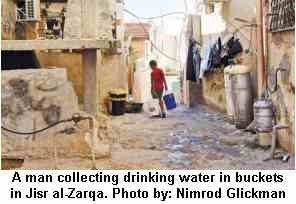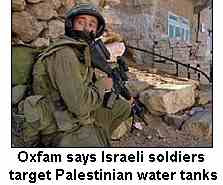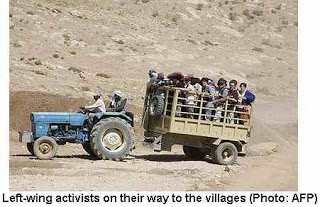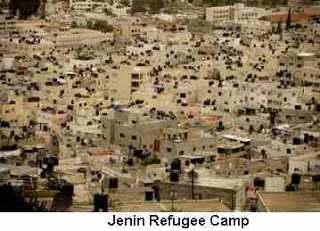One of the main reasons as to why Israel refuses to give up the Occupied Territories is water. Israel is short of it and depends on the theft of vast amounts of water from the aquifers of the West Bank. Whereas water supplies to the Palestinians are restricted, the settlers have access to unlimited supplies. Not for them the delay of water tankers or the ban on Palestinians digging wells beyond a certain depth (no doubt to prevent terrorists sinking too far, since all apartheid restrictions are based on ‘security’).
Below are articles on the French Parliamentary Report accusing Israel of Water Apartheid, from Amnesty International in Yediot and an article on left activists who bring water to the Palestinians and an old pre-Mark Thompson BBC article on Israel’s water theft to be found in the BBC archives.
Tony Greenstein
The French parliament’s Foreign Affairs Committee published an unprecedented report two weeks ago accusing Israel of implementing “apartheid” policies in its allocation of water resources in the West Bank.
The Israeli Embassy in Paris had no foreknowledge of the report and thus did not refute it or work to moderate it. Foreign Ministry officials called the incident “a serious diplomatic mishap.”
The report said that water has become “a weapon serving the new apartheid” and gave examples and statistics that ostensibly back this claim.
“Some 450,000 Israeli settlers on the West Bank use more water than the 2.3 million Palestinians that live there,” the report said. “In times of drought, in contravention of international law, the settlers get priority for water.”
The author of the report was Socialist Party MP Jean Glavany, who in the past served as agriculture minister under French President Lionel Jospin and as cabinet secretary for President Francois Mitterrand.
The Foreign Affairs Committee had assigned Glavany to report on the geopolitical impact of water in confrontation zones throughout the world. He visited Israel and the Palestinian territories on May 17-19 of last year and met with several senior government officials, including Energy and Water Resources Minister Uzi Landau and Water Commissioner Uri Shani.
Both the Foreign Ministry and the embassy in Paris were aware of the visit and knew that Glavany planned to write a report. But Israeli Ambassador to France Yossi Gal did not follow up on Glavany’s work.
No one in the embassy attempted to get a draft copy of the report so as to ensure that its conclusions were not overly harsh. Nor were Israel’s allies on the French Foreign Affairs Committee contacted to ascertain whether the report could be moderated.
The embassy only learned about the report a few days after it appeared on the French parliament’s website, when the Foreign Ministry’s European desk in Jerusalem, which heard about it from an outside source, informed the embassy.
The report states that water is not allocated fairly to West Bank Palestinians and that Palestinians have no access to the territory’s underground aquifers. Glavany said Israel was perpetrating a “water occupation” against the Palestinians.
“Israel’s territorial expansion is seen as a ‘water occupation’ of both streams and aquifers,” the report said.
It also said that “the separation wall being built by Israel allows it to control access to underground water sources” and to “direct the flow of water westward.”
The report accused Israel of “systematically destroying wells that were dug by Palestinians on the West Bank,” as well as of deliberately bombing reservoirs in the Gaza Strip in 2008-09. It also claimed that “Many water purification facilities planned by the Palestinian Water Ministry are being ‘blocked’ by the Israeli administration.”
Senior Foreign Ministry officials said the Paris embassy had been asleep at the switch.
“This report is a serious mishap that has caused diplomatic damage and has seriously damaged Israel’s image in France,” one senior official said.
Foreign Ministry spokesman Yigal Palmor said Glavany had inserted extreme terms into the report on his own, at the last minute, without consulting other members of the report’s working group.
“These unacceptable remarks surprised his colleagues in the working group, who were shocked to find them in the final version after it was published, after Israeli diplomats called their attention to them,” Palmor said.
The report, he continued, “was loaded with the language of vicious propaganda, far removed from any professional criticism with which one could argue intelligently.” Moreover, the report’s author omitted numerous facts and acted “with blatant tendentiousness.”
“After embassy staffers pointed out the exceptional seriousness of the wording … all the working group members disassociated themselves from [the report], including the chairman, who sent an official letter to the ambassador renouncing responsibility for the report’s anti-Israel expressions,” Palmor added.
Associated Press 10.27.09
Amnesty International is accusing Israel of pumping disproportionate amounts of drinking water from an aquifer it controls in the West Bank, depriving local Palestinians of their fair share.
The London-based human rights group also said in a report released Tuesday, that Israel has blocked infrastructure projects that would improve existing water supplies to Palestinians, both in the West Bank and those living in the Gaza Strip.
More Issues With Water
Activists say Palestinians living in caves, temporary buildings forced to pay NIS 50 for gallon of water, as they must bring it from afar. Civil Administration: We supply Palestinians with water
Full Story
“This scarcity has affected every walk of life for Palestinians,” Amnesty’s researcher on Israel, Donatella Rovera, told The Associated Press in an interview Monday, ahead of the report’s release. “A greater amount of water has to be granted to them.”
The report especially focuses on the so-called Mountain Aquifer in the West Bank. It says that Israel uses more than 80 percent of water drawn from the aquifer and while the Jewish state has other water sources, the aquifer is the West Bank’s sole supply of water.
Government spokesman Mark Regev called Amnesty’s claims “completely ludicrous”. He said Israel holds the legal right to the aquifer since it was the first to discover, develop and pump from it.
Regev said Israel pumps less water from the Mountain Aquifer today than it did in 1967, and Palestinian consumption of fresh water has actually tripled in that time.
He blamed the Palestinians for not investing in development in the West Bank and said they have failed even to drill wells that have already been approved.
But Amnesty charged that Israel routinely denies Palestinians permits to launch desperately needed water sanitation and infrastructure projects in the West Bank.
90-95% of Gaza’s water contaminated
Israelis use more than four times the amount of water per person on average than do Palestinians, whose consumption falls far below the minimum amount recommended by the World Health Organization, the report said.
The 450,000 Israelis who live in the West Bank and east Jerusalem use more water than the 2.3 million Palestinian residents, Amnesty said.
Shaul Arlosoroff, a leading authority on water acquisition and use, said Israeli restrictions in the West Bank are meant to protect an already taxed aquifer from overpumping.
In the report, Amnesty also cited serious problems with water supply to the Gaza Strip.
Since Hamas seized control of the coastal territory in 2007, Gaza’s long-standing problems with sewage and water sanitation facilities have deteriorated, Rovera said. During Israel’s offensive in Gaza last year, water and sewage pipes suffered severe damage.
Rovera said the water situation in Gaza had reached a “crisis point,” with 90 percent to 95 percent of the water supply contaminated and unfit for human consumption.
An Israeli blockade of Gaza has halted any repairs to the strip’s overburdened sewage and water networks, preventing materials and equipment to repair the infrastructure from getting in, Rovera said.
“This is a false, manipulative report whose results were predetermined,” Tsviki Bar Hai, head of Har Hevron Regional Council, said in response.
“This is demonstrated by the report saying there are 450,000 settlers, when the actual number is 300,000. in the past few years, he added, “There has been an increase in water theft by Palestinians. Over three million cubic meters of water were stolen in the Hebron area alone in the past year.”
Olga Gouresky
Published: 09.27.09, 13:20 / Israel News
Activists of several left-wing organizations transferred water to Palestinians in the South Mount Hebron area on Saturday. They also tried clearing ways in order to access the Palestinian villages.
One of the activists, Yaakov Manor, told Ynet about the area’s water problem. “We left from several places on two buses and private vehicles. In South Mount Hebron there are villages in which some of the residents live in caves or temporary buildings.”
According to Manor, “They collect the rain water, but it is only enough for a short period of time. In recent years there has not been sufficient rain and they have been forced to settle for water from the Hebron area.
“They bring water from afar, and it is expensive – NIS 50 (about $ 13) per gallon, while Mekorot in Israel charges about NIS 4 ($1).”
The left-wing activists said they had brought 25,000 liters (845,350 ounces) of water in containers.
“This Palestinian population lives in grave conditions. They want to create a territorial sequence on the Arad-Ein Gedi line. It appears that Israel wants to annex this territory and is doing all it can to remove them from there. The roads are very difficult. The IDF occasionally blocks the road to the villages, preventing the Palestinians from transferring water and food.”
He noted that the settlers in the area do get water. “The Carmel settlement, which is in the area, received water regularly, and they even grow gardens. If in Israel the consumption is 266 liters (8,994 ounces) per person a day, in these places the average is no more than 15 liters (507 ounces) per person a day.”
The water was supplied by activists from the Gush Shalom and Yesh Gvul organizations and other left-wing groups.
The Civil Administration said in response, “In general, the Palestinian Water Authority is responsible for supplying water to Palestinians residents. Nonetheless, the Civil Administration has opened a water filling spot in the Carmel area, where water has been transferred from the community for Palestinian use for many months now.”
Israel stealing water from Palestine
Like many other things in the region, water is in hot dispute between the Israelis and the Palestinians.
Under international law, Israel is committed to supplying drinking water to the Palestinians and not denying them.
But Israel itself is a very arid area surrounded by desert. It rains only a few months a year – and for the past few years the region has been in the grip of drought.
“We have a chronic water shortage, and it is getting worse year to year,” Jacob Kaidar, the director of multilateral peace talks coordination and water issues in the Israeli foreign ministry, told BBC World Service’s Politics Of Water programme.
“Basically we have a drought almost every year, we have to cut our water supplies almost every year.”
‘Unfair’
The water that Israel receives comes mainly from the Jordan river system, the Sea of Galilee and two underground sources.
The supply is shared between Israelis and Palestinians, but, as ever, is a source of great controversy.
At the Third World Water Conference in Kyoto, former Soviet President Mikhail Gorbachev outlined the history of water conflict around the world.
He said there had been 21 armed disputes over water in recent history – and 18 of them involved Israel.
“It’s highly unfair,” said Yehezkel Lein, a water expert for Israeli human rights group B’tselem, who help to solve water problems in Palestinian areas.
“We are talking about mainly the mountain aquifer and the Jordan River system. Regarding the first one Israel exploits approximately 80% of the renewal water resources, and the Palestinians the remaining 20%.
“Regarding the Jordan River system, the Palestinians do not have any access.”
Sea of Galilee
The Sea of Galilee can supply parts of Israel, but not the Palestinian areas
Mr Lein added that the conflict in the region had dramatically exacerbated the problem.
“There is a clear linkage between the gap in water availability, and the occupation,” he said.
“Israel has taken advantage of its control of the West Bank in order to appropriate more water sources and to prevent Palestinians from developing new water sources that are under the land.”
Israel has controlled water supplies in the West Bank and Gaza Strip since it first occupied the areas in 1967.
The 1993 Oslo Peace Accord stated that the Palestinians should have more water resources and greater control, although the Israelis disagree, insisting they supply 40 million cubic metres of water.
Many Palestinians struggle, however, as they remain unconnected to any water infrastructure.
Checkpoint controversy
One such place is Beit Furik, a village in the West Bank near the Palestinian town of Nablus.
“The real problem is at the beginning of their hot summer – they will have used up their water and they will begin to suffer,” explained Beit Furik’s Mayor, Atef Atif Hanani.
“We have about 12 tanks to collect water from Nablus, but during the Intifada the Israeli authorities have imposed checkpoints on the roads.
“These checkpoints started to forbid these tanks from reaching Nablus, so sometimes they have to wait for about five or six hours – and some days they were forbidden.”
He added that even when the tanks were allowed through, sometimes Israeli soldiers would undo the valves and let the water back out.
Israel’s Water Minister Mr Kaidar said he was “not happy” about a lack of co-operation, acknowledging that turning water trucks away was “totally unacceptable.”
“Israel is committed to supplying drinking water to the Palestinians, and not to deny them,” he added.
But Jacob Dallal of the Israel army said that delays were unfortunate, but necessary to stop the militants.
“This is the nature of this conflict when people are trying to smuggle things including suicide bombers through the West Bank and into Israel,” he said.
“We have to be very careful, but at no time lose sight of the importance of getting essential materials to people.
“We do have to check because in the past, as has been the case with ambulances, people have taken advantage of vehicles that are supposed to be only for humanitarian purposes.”
Some statistics suggest that, in large part because of these constant arguments at checkpoints, the Palestinians use on average four times less water than the Israelis.
Illegal wells
The mother of one family in Beit Furik, Fuaz Hanani, told Politics Of Water that they were only able to wash every two weeks, such was the shortage of water.
“I feel angry that Israeli settlers in Itmar drink clean water while my dear family drink water from a well which sometimes has dirty or polluted water,” Mrs Hanani said.
However, Jacob Kaidar insisted that, while he hoped co-operation between the two sides would be better in the future, Mrs Hanani should direct her anger towards her own people.
He said Palestinians were stealing water from Israeli pipes and drilling illegal wells.
“In Gaza we have some 2,000 illegal wells, in the West Bank the report is 250 or more,” he said.
According to Oxfam, an additional problem is that what little infrastructure the Palestinians do have is targeted by the Israelis.
“We are helping very poor families to build new tanks on their roofs… unfortunately it’s a really good target for Israeli soldiers to shoot at,” Oxfam’s Ton Berg stated.
“We’ve just finished a really big water tank that would serve half a village in El Boursh and now the Israeli defence forces have announced that they will destroy it, because they need land that is officially Palestinian to build a wall.
“So that whole village this summer will again be without clean drinking water.”
With the publication of the roadmap to peace, there had been hopes that political leaders would begin to look more closely at the water crisis in the region.
But with the roadmap apparently in crisis, it seems the Palestinians may be thirsty for a good while longer.





Antisemite, how do you want Israel to supply you with your LOW LIFE free time activity, AS WHAT WILL YOU BOYCOTT
I was going to place the above comment in the spam box but then I thought to myself that this is such an articulate defence of the theft of Palestinian water that it was only right to allow, in the interests of freedom of speech, one of the thieves representatives to defend the practice.
Of course telling the truth is anti-Semitic, by definition. Pity Hitler didn't get in on this act. Concentration camps? Good gracious me, that seems like you are anti-German sir!
Can't understand his bit about boycott but no doubt his passions ran ahead of his pen.